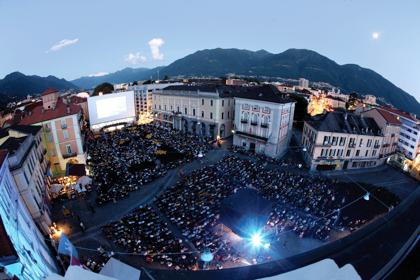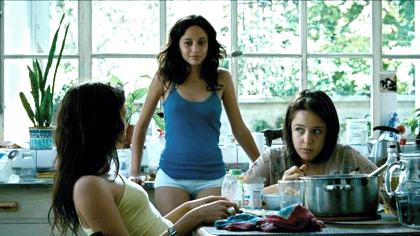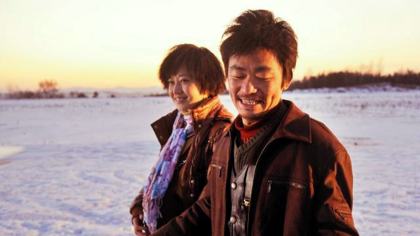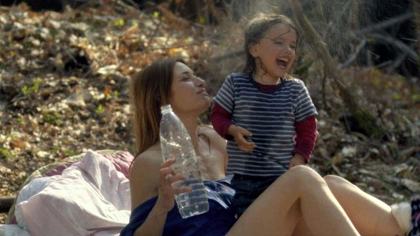Postcard
Locarno: big stage, new talent

Locarno’s Piazza Grande
Locarno Film Festival
Locarno, Switzerland
August 2011
Sender: Isabel Stevens
At the start of August, as the colossal screen and a projector box the size of a small cinema arrive in Locarno’s main square, residents and regulars – yacht-owners and hikers alike – know that the yearly invasion of cinephiles has begun. For 11 days the festival’s signature leopard print covers the chic Swiss lake-side resort; sports and exhibition complexes are transformed into cinemas, while boisterous queues form outside smaller theatres tucked up cobbled streets.
Atmosphere has never been a problem for the Locarno Film Festival. It’s impossible not to be charmed by moonlit screenings attended by a 5,000-strong crowd, surrounded by picturesque architecture and mountain peaks, even if it’s Daniel Craig and Harrison Ford in Cowboys and Aliens towering over you. (Two screenings I wasn’t around for – Minnelli’s An American in Paris and Kaurismäki’s new offering Le Havre – were far more enticing propositions.)
For a festival sandwiched between Cannes and Venice, though, programming is always going to be a challenge. Hence Locarno’s calling card: new talent. This year there were many tempting distractions (a Vincente Minnelli retrospective, a tribute to Abel Ferrara and a sidebar dedicated to Indian Cinema were just a few), but as always, emerging voices dominated the line-up. Even in the main competition, little-known directors outnumbered the more established arthouse names (to wit, Aoyama Shinji, Mia Hansen-Løve, Nicolas Klotz…).
My competition trawl kicked off with Danielle Arbid’s noir Beirut Hotel. Its swirling plot, focussed on a web of anonymous factions (secret police, spies, political networks) beneath the city’s surface, sparked little intrigue, but Arbid’s camera was certainly attune to everyday life and the divisions rife in Beirut society.
The search ended with Federic Choffat and Julie Gilbert’s Mangrove, which told a predictable beach-paradise-turned-sour murder story that even the sensuous, saturated cinematography couldn’t hope to rescue.

Abrir Puertas y Ventanas
In between these rather disappointing bookends there were love stories – melancholy (Hansen-Løve’s Un Amour de jeunesse), eccentric (Aoyama’s Tokyo Koen) and precarious (Julia Loktev’s The Loneliest Planet) – a claustrophobic family saga (Milagros Mumenthaler’s charming debut Abrir Puertas y Ventanas, which scooped the Golden Leopard award) and an abundance of revolutionary fervor, from 18th century smugglers in Rabah Ameru-Zaïmeche’s enchanting Les Chants de Mandrin to contemporary bourgeois students in Nicolas Klotz and Elisabeth Perceval’s provocative Low Life. (See the forthcoming October issue of Sight & Sound for more on these.)
Navigating the selection of first and second features gathered together in the ‘Concorso Cineasti del presente’ section was largely a matter of chance encounters and, as the lights went down and the onscreen leopard snarled, crossing your fingers.
In its entry on Ruslan Pak’s Hanaan, the festival catalogue seemed to promise an Uzbeki-Korean cross between Serpico and Trainspotting. Yet it turned out the elaborate plot – centred on a heroin-addicted ex-policeman (Uzbeki-born, Korean descended) bent on avenging a friend’s murder – was the least exciting element of this largely impressive debut, shot on the sly without the local authorities’ permission. The main draw was the film’s early scenes of male teenage camaraderie, as well as Pak’s honest depiction of outsider life amidst the grey streets and grimy stairwells of Tashkent.

Hello! Mr Shu
Elsewhere, I stumbled out of an oversubscribed screening into Jie Han’s over-ambitious but nonetheless intriguing fable Hello! Mr Shu. Given the film’s focus on urbanisation and forced relocation (it’s set in a village in China’s snowy northern industrial hinterlands, which a mining company is slowly absorbing) it’s no surprise to see a producer credit for Jia Zhangke.
Like Jia, Jie explores village routine and traditions, and the surrounding barren landscape, with a mixture of gritty realism and poeticism filtered through a muted palette. At the film’s heart is an amusing but affectionate portrait of oddball village misfit Shu and his relationship with a local deaf-mute girl, Xiaomei. After the attention paid to developing this aimless klutz and his tentative romance – Shu’s awkward text-and-note courtship of Xiaomei were some of my favourite scenes at Locarno – though, it was a shame to find the film taken over by a drama-packed plot with surreal hallucinations, a clunky voiceover and flashbacks.

Nana
Another tender character study and another isolated rural setting was offered by Valerie Massadian’s debut Nana, which won best first film. Throughout, Massadian keeps the perspective confined to that of the titular four-year-old girl – so we know as little as she why her mother suddenly abandons her one day in their remote cottage.
Some beautiful countryside pans apart, it’s shot with a static camera, and Massadian intimately captures the young girl both tentatively playing adult and yet retreating into her own world. (In one of the film’s most memorable moments she claims an ensnared dead hare for her toy collection.) It’s a quiet, simple piece of filmmaking which manages to keep its narrative secrets locked up tight without seeming affected, and never errs on the side of cute.
During my six-day visit, the only unwelcome presence was the rain – but if Abel Ferrara, on stage to collect his Lifetime Achievement award, wasn’t put off by the downpour (even as he and his band were booed by a mac-wearing Piazza Grande crowd keen to watch Friends with Benefits), then who were we to complain?
And if it all got too much, one of Minnelli’s 34 films was never far away. I can heartily recommend Shirley Maclaine’s wide-eyed, lovable floozy in Some Came Running (1958), a feisty bickering Lauren Bacall and her extravagant costume changes in Designing Woman (1957), as well as the dark depths of family breakdown mined in Minnelli’s underrated melodrama The Cobweb (1955), as the perfect antidotes for tired eyes and soggy feet.
See also
Olivier Père: our video interview with Locarno’s new director (August 2010)
The new school: Mar Diestro-Dópido on a thriving IndieLisboa festival brimming with young international talent (May 2010)
24 City reviewed by Tony Rayns (May 2010)
Father of My Children reviewed by Ryan Gilbey (March 2010)
Welcome to the circle. Bang bang.: Iain Sinclair claims Abel Ferrara’s The King of New York for the all-time best films list (May 2002)
Xiao Wu reviewed by Tony Rayns (March 2000)
